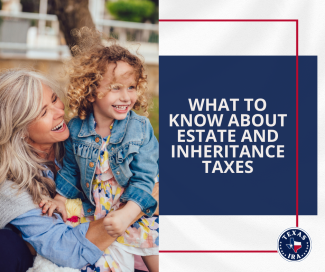
Death and Taxes: What to Know About Estate and Inheritance Taxes
There are only two things in life you can count on happening at some point--death and taxes. In death, these two circumstances can come together at the same time. When a person dies, leaving a significant estate, there is the expense of estate and inheritance taxes.
Knowing about these taxes, who pays them, and how the process works may make a challenging moment less stressful. Here’s an explanation about how estate and inheritance taxes work.
Estate and Inheritance Taxes: What Are They?
Estate and inheritance taxes are both posthumous taxes on assets, but they’re two very different types of taxes.
Estate Tax
The estate tax is the amount of the deceased’s estate paid to the state or federal government before the remainder of the estate passes to the heirs. The estate's executor (also called the administrator) pays this tax before anything goes to the heirs. The executor must submit the estate tax return and pay any taxes.
Inheritance Tax
An inheritance tax is a tax on the assets after their distribution to the beneficiaries. Beneficiaries may have to pay taxes on their share of the estate.
Who needs to pay estate taxes?
Estate taxes are due at the federal level if the deceased’s estate is worth more than a certain amount.
Exemption
The federal estate tax exemption in 2024 is $12.92 million. This exemption means there are no federal estate taxes to pay on an estate worth less than this amount. However, if the estate is worth over $12.92 million, the amount above the threshold is taxable.
Estate Taxes in Your State
Many states collect estate taxes, and exemption levels vary. Some states have far lower exemption thresholds than the federal government. State estate taxes might be due if the deceased lived in one of these states or had property in one of these states, even though the estate is exempt from federal estate taxes.
Who must pay inheritance taxes?
In contrast to estate taxes, inheritance taxes are paid by the heirs who inherit from the estate. Only a handful of states levy inheritance taxes, and the amount owed varies from one to the next. The states currently taxing inheritance are Iowa, Kentucky, Maryland, Nebraska, New Jersey, and Pennsylvania.
How to Lower or Avoid Estate and Inheritance Taxes
You might be a little wary of estate or inheritance taxes, but there are ways to avoid or manage them. With proper planning, you may leave more of your fortune to your loved ones rather than paying taxes to the government.
Use the Annual Gift Tax Exclusion
You may give a portion of your estate to someone every year without having it count toward your lifetime estate tax exemption. The gift tax exclusion in 2024 is $17,000 per recipient annually. This exclusion means you may gift as much as $17,000 per person to as many people as you want without the risk of paying any gift tax.
Use Trusts
Trusts are the most common means of guarding wealth. Some trusts, such as an irrevocable life insurance trust (ILIT), remove life insurance proceeds from your taxable estate. Others, such as a Charitable Remainder Trust (CRT), help you to leave things to charity while managing your taxable estate.
Use the Marital Deduction
If married, under the unlimited marital deduction, you may give your spouse assets without any tax penalty. This strategy delays any estate tax until the surviving spouse dies.
Spend Down Your Estate
Another way to make your estate go down is to pay down your estate while you’re still alive. You may give things to your heirs, pay school fees or medical bills, or just invest in your lifestyle to enjoy your fortune and save on your estate tax bill.
Seek Professional Help
Estate and inheritance taxes may be complex – especially for estates with significant assets. State tax regulations differ, and there are several options to choose from. You may want to work with a tax professional or estate planner to help you understand what to do and devise a plan that works for your family.
Important Disclosures
Content in this material is for educational and general information only and not intended to provide specific advice or recommendations for any individual.
This information is not intended to be a substitute for specific individualized tax or legal advice. We suggest that you discuss your specific situation with a qualified tax or legal advisor.
All information is believed to be from reliable sources; however, LPL Financial makes no representation as to its completeness or accuracy.
LPL Financial Representatives offer access to Trust Services through The Private Trust Company N.A., an affiliate of LPL Financial.
This article was prepared by WriterAccess.
LPL Tracking #665085

